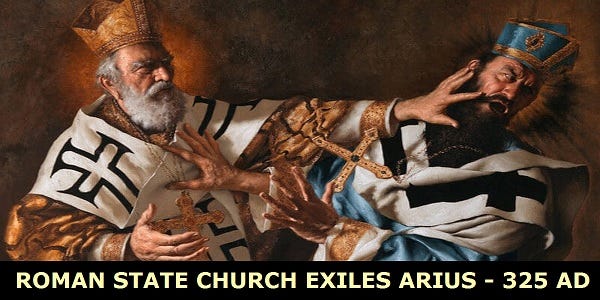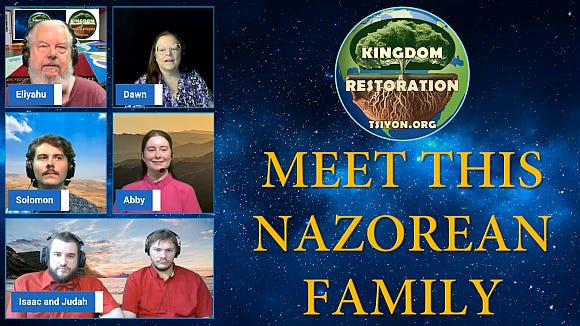TSIYON NEWS - Divine Messiah
Tsiyon Messianic Radio Newsletter - Vol 19.40 - 08/07/6024 TAM - 10/10/2024 AD
From Eliyahu
Is Jesus God, or a created being? People have been banned and even killed for holding to either side of this question. Interestingly, this was not that hot a contested issue until the 4th Century, when Roman politics got involved under the Roman Emperor, Constantine 1. Britannica says this about Constantine:
"Constantine reigned during the 4th century CE and is known for attempting to Christianize the Roman Empire. He made the persecution of Christians illegal by signing the Edict of Milan in 313 and helped spread the religion by bankrolling church-building projects, commissioning new copies of the Bible, and summoning councils of theologians to hammer out the religion’s doctrinal kinks."
The question here is: why would a pagan Roman emperor promote Christianity?
Here is a likely answer:
"...his main objective was to gain unanimous approval and submission to his authority from all classes, and therefore he chose Christianity to conduct his political propaganda, believing that it was the most appropriate religion that could fit with the imperial cult. Regardless, under the Constantinian dynasty Christianity expanded throughout the empire, launching the era of the state church of the Roman Empire." ("Constantine I", in Britannica Encyclopedia of World Religions (Encyclopædia Britannica, 2006), p. 262).
Think about it. The Gentile Christians had broken off from the original Hebraic Nazoreans, and subsequently brought many of their Greek and Roman philosophies and pagan religious traditions with them into the "Church." By the 4th Century their syncretistic religion already had a lot in common with the pagan religions of the day. It could only strengthen the empire to raise up one state religion that could absorb all others, to bring the whole population under one "Church" which, in turn, promoted the interests of the Roman Empire.
This is a plan that any antichrist would have to love. Further, all of this could be done under the guise of "freedom of religion" for all, whether pagan or Christian. It was just a matter of the state giving money and privileges to the state church, while withholding the same from all other religions. Besides, if you as a pagan enjoyed the Saturnalia, an ancient Roman holiday honoring the god Saturn, you could just switch at the same time of year to celebrating the Christian version that we now know as Christmas. This was true of other customs as well, making it easy for pagans to become nominal Christians, so they could sign on to the privileges of the state church, as those benefits flowed from the Roman Empire.
So what do you think? Should the Roman Empire have final authority over what is and is not considered the "orthodox" truth that all must claim to accept?
This brings me back to my original question: Is Jesus God, or a created being? In the 4th Century this was not a settled question among the Roman Christians. At that time a theologian by the name of Arius led the charge on behalf of those who believed Jesus was not God, but was a created being. That position is still known as Arianism.
"Arianism, in Christianity, the Christological (concerning the doctrine of Christ) position that Jesus, as the Son of God, was created by God. It was proposed early in the 4th century by the Alexandrian presbyter Arius and was popular throughout much of the Eastern and Western Roman empires, even after it was denounced as a heresy by the Council of Nicaea (325)."
It was Emperor Constantine I who summoned 318 eastern bishops to the First Council of Nicaea (now İznik, Turkey) in 325 AD. This was, in fact, the first ecumenical council of the Christian Church. At that time emperor Constantine I was not even a baptized Christian, yet he presided over the proceedings. He didn't like controversy dividing his empire, so determined to resolve the stir created in the Eastern church by Arianism, which affirmed that Christ is not divine.
The council solution under the emperor was to condemn Arius. The emperor then exiled Arius. This act cemented the control of the State over the Church, even in ecclesiastical affairs. (Yeshua had told Pilate that His Kingdom was not of this world. Apparently, in 325 AD the Church clearly was of this world, and still is.)
The intent of Constantine's Nicaean Council was to end Arianism. Did it?
Decades after the council of 325 AD, just before Constantine's death, he chose the Arian bishop Eusebius of Nicomedia to baptize him as a Christian. That's right, he never was a Christian during the years he wielded imperial power over the Church. Also, his choosing to be baptized by an Arian is curious indeed, considering he had exiled Arius for heresy.
The council had attempted to cement their condemnation of Arius by introducing the First Nicene Creed, which set out a formula of belief all Christians must accept. Of course, not all agreed to the wording, which was re-worked a number of times for various reasons. The eventual version is a Christian statement of faith that is the only ecumenical creed, because it is accepted as authoritative by the Roman Catholic, Eastern Orthodox, Anglican, and major Protestant churches. The Apostles’ and Athanasian creeds are accepted by some but not all churches, while others accept none but their own. Even now both churches and individuals continue to argue over the question of the divinity of Christ.
Here's the real deal. Orthodox creeds sprang out of Roman politics, and an effort to force people to claim positions not their own - all for the sake of a sort of unity that is not real unity at all. This all smacks of the philosophy of force employed by the Roman Empire, and all other despots. Creeds are thus a product of man-made religion, not an evidence of the Spirit at work.
Contrast this with the methods of our Messiah. Yeshua walked with His disciples for years before they knew He was the Messiah, let alone the Divine Son of God. Yet, He did not exile them for their lack of vision. What finally opened their eyes to His divinity? Consider the case of Thomas:
"Thomas, one of the twelve, called Didymus, wasn't with them when [the risen] Yeshua came. The other disciples therefore said to him, We have seen the Lord!
But he said to them, Unless I see in his hands the print of the nails, and put my hand into his side, I will not believe.
After eight days again his disciples were inside, and Thomas was with them. Yeshua came, the doors being locked, and stood in the midst, and said, Peace be to you.Then he said to Thomas, Reach here your finger, and see my hands. Reach here your hand, and put it into my side. Don't be unbelieving, but believing. Thomas answered him, "My Lord and my God!" (John 20:24-28)
Do you understand? The Divinity of Yeshua is not a matter of logic nor religious formulas. If you are talking about the nature of the infinite Divine you are traversing ground far beyond the confines of the finite human mind. It is a matter of a heart connection and revelation. It must be your honest experience.
Like Thomas, good people who love God may not have come to a place where that particular connection with Yeshua as Divine has been made. Maybe, instead of exiling them as Constantine and the Roman Church did, and as many champions of orthodoxy still do, we should acknowledge their honest search for truth, and be praying for them to have their eyes opened to see what Thomas saw in one amazing moment of revelation.
Along the same lines, in our live stream tonight we will be talking about an unlikely figure who would not be expected to see and believe in the Divinity of Messiah - and yet, he did. This case was so amazing that "when Yeshua heard it, he marveled." Trust me, it takes a lot to make the Son of God "marvel" over anything!
Tonight we will be live streaming our next episode of Yeshua's Narrow Way entitled: Divine Messiah Revealed, in which we will be considering this amazing case that even caused Yeshua to marvel. Our live stream will begin at Tsiyon.Net at 8 PM, Central. Here is a perspective on the Divinity of Christ you won't want to miss.
Eliyahu
Tsiyon.Org
You have heard about the ancient Order of Nazoreans. Now meet some!
"In the world you shall have tribulation; but be of good courage!
I have overcome the world." John 16:33







